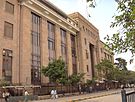- Delta One
-
Financial markets
Exchange
SecuritiesBond market Fixed income
Corporate bond
Government bond
Municipal bond
Bond valuation
High-yield debtStock market Stock
Preferred stock
Common stock
Registered share
Voting share
Stock exchangeDerivatives market Securitization
Hybrid security
Credit derivative
Futures exchangeOTC, non organized Foreign exchange Other markets Money market
Reinsurance market
Commodity market
Real estate marketPractical trading
Finance series
Banks and banking
Corporate finance
Personal finance
Public financeDelta One products are a class of financial derivative that have no optionality and as such have a delta of (or very close to) one - that is to say that for a given percentage move in the price of the underlying asset there will be a near identical move in the price of the derivative. Delta one products often incorporate a number of underlying securities and as such give the holder an easy way to gain exposure to a basket of securities in a single product. Examples include equity swaps, forwards, futures and ETFs.[1]
Contents
Delta
For a derivative, the delta measures the sensitivity to changes in the price of the underlying asset. The delta (Δ) of an instrument is the first mathematical derivative of the option value with respect to the underlier's price.
Types of products
It is a derivative with a linear, symmetric payoff profile. That is, not an option or a product with embedded options. Examples of delta one products are Exchange-traded funds, equity swaps, custom baskets, linear certificates, futures, forwards, trackers, and Forward rate agreements. As the price for these products closely track their underlying asset and risk free rate, their delta will be close to 1.
Trading desks
Delta One trading desks are either part of the equity finance or equity derivatives divisions of most major investment banks. They generate most revenue through a variety of strategies related to the various delta one products as well as related activities, such as dividend trading, equity financing and equity index arbitrage. In theory such desks should be relatively low risk areas for the banks as the products are generally hedged.[2] FT Alphaville has described Delta One trading as "one of the hottest areas in banking"[3] and "...the last domain of prop trading in the banking sector, where via market-making activities, traders can still get away with taking ample risks."[4]
Two high profile cases of losses resulting from rogue trading (those of Jérôme Kerviel at Société Générale and Kweku Adoboli at UBS) involved Delta One traders.[5][2]
References
- ^ "What is Delta One? definition and meaning". Investorwords.com. http://www.investorwords.com/11562/Delta_One.html. Retrieved 2011-09-15.
- ^ a b "Delta One back in the spotlight". Efinancialnews.com. 2010-11-30. http://www.efinancialnews.com/story/2010-11-30/delta-one-back-in-the-spotlight. Retrieved 2011-09-15.
- ^ Kaminska, Izabella (2011-04-11). "FT Alphaville » Delta one: the special ops of equity trading". Ftalphaville.ft.com. http://ftalphaville.ft.com/blog/2011/04/11/541181/delta-one-the-special-ops-of-equity-trading/. Retrieved 2011-09-15.
- ^ Posted by FT Alphaville on Sep 15 11:49.. "FT Alphaville » The curse of Delta one strikes UBS". Ftalphaville.ft.com. http://ftalphaville.ft.com/blog/2011/09/15/678306/the-curse-of-delta-one-strikes-ubs. Retrieved 2011-09-15.
- ^ "UBS trader Kweku Adoboli arrested over 'rogue deals'". bbc.co.uk. http://www.bbc.co.uk/news/business-14927432. Retrieved 2011-09-15.
Categories:- Derivatives (finance)
Wikimedia Foundation. 2010.

